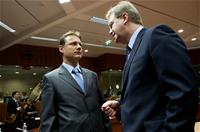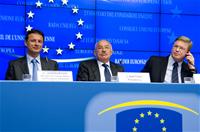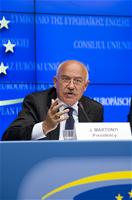The EU gave a strong support to Croatia
Adelina Marini, Evelyna Topalova, April 20, 2011
 Croatia is walking steadily on the path of European Union membership after it managed to close on April 19 two big and very important chapters - Chapter 11 Agriculture and Rural Development and Chapter 22 Regional Development and Structural Instruments. As Hungarian Foreign Minister Janos Martonyi said at a news conference after the EU-Croatia Association Council, "we closed two chapters which relate to common policies covering 70-57% of the overall European union budget". This is so because the Common Agriculture Policy, covered by Chapter 11, receives almost half of the budget of the Community (approx. 44%) and in regional development are all the EU funds.
Croatia is walking steadily on the path of European Union membership after it managed to close on April 19 two big and very important chapters - Chapter 11 Agriculture and Rural Development and Chapter 22 Regional Development and Structural Instruments. As Hungarian Foreign Minister Janos Martonyi said at a news conference after the EU-Croatia Association Council, "we closed two chapters which relate to common policies covering 70-57% of the overall European union budget". This is so because the Common Agriculture Policy, covered by Chapter 11, receives almost half of the budget of the Community (approx. 44%) and in regional development are all the EU funds.
More interesting is the context in which Croatia closed precisely these two chapters. After the words of Janos Martonyi himself, whose country currently presides over the European Union, "this is an extremely important day. In the present political situation and political mood due to some recent developments it is extremely important that we send a positive political message for Croatia". Mr Martonyi obviously had in mind the political crisis in which Croatia fell recently after a series of protests and the demand for early elections.
The Hungarian top diplomat also said that for Hungary it was still a goal Zagreb to complete the negotiation process by the end of the Hungarian Presidency (end-June). According to him, the deadline is indeed quite ambitious but achievable, if of course Croatia would do its work. He recalled that the Accession Treaty was being written and the successful end of the negotiations with Croatia would send an important message towards the Western Balkans. However, the countries in the region will have to continue with reforms, especially those in the sensitive areas of judiciary, fight against corruption and organised crime, as well as the Balkan wound - the cooperation with the tribunal in the Hague.
Having mentioned judiciary, one of the questions that was raised by a number of journalists (we have to note that this time media interest was significant) was whether Croatia would join the EU with a "probation" - a monitoring mechanism similar to that of Bulgaria and Romania (Control and Verification Mechanism). To this question EU Commissioner on Enlargement Stefan Fule answered by recalling once again that the European Commission had no intent to suggest any kind of  mechanisms for verification and monitoring. "The Commission made it very clear that such a mechanism is incompatible with the credibility of the process".
mechanisms for verification and monitoring. "The Commission made it very clear that such a mechanism is incompatible with the credibility of the process".
Fule underlined though, that there was actually a monitoring mechanism in force until the end of the ratification process of Croatia's Accession Treaty. Besides, the Commission and member states will monitor how Croatia is doing on the negotiations on the remaining 5 chapters (of 35), but they will also follow its work on the already closed chapters. And all this up to the time when the last member state ratifies the Accession Treaty.
And precisely with regard to the "probation" a very embarrassing question sounded in the hall - whether it was possible Bulgaria and Romania to delay Croatia's ratification process to revenge that it will get away without a mechanism. To this Stefan Fule said that the ratification process took time and refused to speak on behalf of Bulgaria and Romania. He added, though, that it was unlikely both countries to desire to remain with a mechanism for a long time but that it depended on themselves whether the mechanism would be removed. The fact that this question was raised should be a subject of a separate analysis on the complex Balkan relations in the context of the European integration of the Balkan countries and whether it actually existed.
Another important question raised during the news conference was the trial that ended at first instance against general Ante Gotovina in the International Crime Tribunal for former Yugoslavia in the Hague. Journalists from local (Croatian) and leading international media wanted to know whether the sharp reaction of the Croatian authorities against the verdict would hamper the process of accession of the country.
After a trial that went for three years, on April 15 the Hague tribunal announced the long-expected verdict against three Croatian generals, which enraged the Croatians and unleashed a wave of protests of war veterans and ordinary citizens. The tribunal claimed guilty the generals, considered heroes in their homeland, Ante Gotovina and Mladen Markac, sentenced to 24 and 18 years in prison for war crimes perpetrated during the military offensive Storm in 1995. The third general - Ivan Cermak was acquitted and returned to Zagreb.
The tribunal stated that both generals were part of an organised crime group, whose aim was to permanently drive away the Serbs from Krajina. Through that military operation the Croatian army regained control over regions occupied by Serb separatists in 1991 and which ended the Serb-Croatian war. The Croatians were outraged not only by the size of the sentences. The qualification itself, about the organised crime group, angered them additionally, because according to the tribunal key political and military figures were part of it. Local leaders immediately committed to appeal the verdict and announced that they would start diplomatic and other actions in support of the generals.
The sentences against national war heroes led to a sharp drop of the support for the EU. A rapid poll of the Ipsos Pulse agency, held a day after the announcement of the verdicts, showed that if a week before the support for EU membership was 60 per cent, now it has collapsed to 35%.
Angry war veterans even demanded a cessation of the accession negotiations, claiming the government was forced to do too much concessions and to sacrifice the generals for the sake of membership. To recall - the cooperation with the Hague tribunal is one of the key conditions for Zagreb's EU integration and the arrest of former legion general Gotovina made it possible for Croatia to start the accession talks.
 Against this backdrop the young deputy prime minister and minister for foreign affairs, Gordan Jandrokovic, said in Brussels that Croatia would continue to work with the tribunal and that it respected international law. The decision of the court is at first instance and Croatia would appeal "some specific qualifications". Responding to the question of the colleague from The Guardian on the fact that Prime Minister Jadranka Kosor called the verdict "unacceptable", her deputy said that Ms Kosor had not said that she did not accept the verdict. He again recalled, reading from a piece of paper, that Croatia would appeal against certain qualifications in the framework of the legal procedure.
Against this backdrop the young deputy prime minister and minister for foreign affairs, Gordan Jandrokovic, said in Brussels that Croatia would continue to work with the tribunal and that it respected international law. The decision of the court is at first instance and Croatia would appeal "some specific qualifications". Responding to the question of the colleague from The Guardian on the fact that Prime Minister Jadranka Kosor called the verdict "unacceptable", her deputy said that Ms Kosor had not said that she did not accept the verdict. He again recalled, reading from a piece of paper, that Croatia would appeal against certain qualifications in the framework of the legal procedure.
On his part Commissioner Fule added that the European Commission had taken into account the verdict as well as the actions of the Croatian government, which however had nothing to do with the negotiations process. The full cooperation with the tribunal is in the framework of Chapter 23 Justice and Fundamental Rights, which is still not closed.
And if after the Association Council the political message is again clear - Croatia must be a member of the EU for long-term benefits for regional stability, the message conveyed during the Joint Interparliamentary session between the European Parliament and the parliaments of the Western Balkans last week, said that politicians in the Balkans still had not learnt from the problems which Bulgaria and Romania created and will have to aim higher. In the same sense spoke Commissioner Fule, commenting on a journalist's question on when Serbia could be expected to receive a candidate country status.
To this Fule again recalled that there should not be a distinction between beginning of negotiations and receiving a candidate status. "The politicians in the Western Balkans should aim high and be ambitious in the reform process instead of dividing this important step into two - first candidacy and then opening of the accession process".
And we can add that Balkan politicians should learn one more thing - dates in themselves mean nothing. What is essential is substance, what has indeed been done, not for the sake of Brussels or someone else, but for the sake of citizens. Something which politicians in Bulgaria have still not learnt in spite the fact that five years have passed since Bulgaria joined the European Union.
 Bakir Izetbegovic, Andrej Plenkovic | © Council of the EU
Bakir Izetbegovic, Andrej Plenkovic | © Council of the EU Aleksandar Vucic, Recep Tayyip Erdogan | © Serbian Presidency
Aleksandar Vucic, Recep Tayyip Erdogan | © Serbian Presidency Jean-Claude Juncker, Zoran Zaev | © European Commission
Jean-Claude Juncker, Zoran Zaev | © European Commission